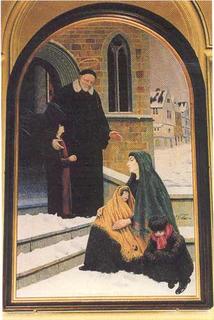
Vincent came from a poor family of farmers, as was the case of many families in his area of Pouy in Gascony. His father tried very hard to provide for his growing family in a time where social welfare benefits did not exist.
Vincent was born in the year 1580 where he joined his other brothers and sisters. From an early age Vincent made known his wish to become a Priest and his devout father encouraged him in this ideal.
Though Vincent’s father only wished the best for his son by hoping that he would be a good and Holy Priest, Vincent’s own thoughts of entering the Priesthood may not have been so idealistic.
For Vincent like many youths born into impoverished families wished to escape the poverty cycle, and to gain for himself various distinctions and honours. Vincent was to succeed in his quest and became a Priest at the early age of only 20 years old! There were times when Vincent’s father would visit this son whom he loved, but Vincent was embarrassed that his father came from such humble stock, and he tried to hide this fact from his father.
Vincent made a few journeys to Rome upon becoming a Priest but his wish of early advancement did not materialise. Though Vincent struggled with pride he overcame this when he was kidnapped by renegades and taken as a prisoner and slave in Tunis from whence he escaped two years later.
This experience was to light a fire in Vincent’s heart for the poor and destitute in his native France. It was whilst serving as a tutor for a wealthy family that he took a new interest in the poor and suffering people in his own area. And also became concerned over the lack of religious zeal amongst the peoples both wealthy and poor.
This was enough to inspire Vincent upon his goal to be of help to the poor in a common sense approach, for he went to his wealthier Catholic community in order to gather donations for his mission, to help the poor help themselves.
This holy Priest's charity and humility grew as he saw the desperate poverty of many families and also of prisoners, Vincent became determined to do all he could to not only alleviate their conditions but to help them become self sufficient.
It was whilst he was Parish Priest in Bresse that another parishioner brought news of a family who were starving and had no means of support. In his Homily Vincent appealed to his congregation to give generously to this family, the parishioners who had a great respect for this Holy Priest did not disappoint him. It was from this occasion that Vincent was able to organise a more practical way of helping the poor, by drawing up a Rule which then became known as the Confraternity of charity, he then requested that the women take it in turns to visit the poor and homeless in their area.
Vincent had come far in his spiritual progress he was no longer proud nor was he longing for worldly positions, but he had a deep and abiding love for the poor and the imprisoned. He truly was a humble and loving Priest, just as his father and mother had wished and hoped for.
This was to become Vincent’s mission in life to help and serve the poor not as a person of importance but of being a servant to the poor, he embodied what True charity is!
His love for Jesus also became more intimate as he embraced Jesus love for the poor and longed to follow in His Lords footsteps, for he had come to recognise the face of Christ amidst the poor.
It was in 1625 that the Congregation of the Mission to serve the poor began in its infancy The Archbishop of the area approved of this new Mission and supplied a motherhouse for its members.
It was as he went about ministering to the poor that a young woman came to his attention who had a deep compassion for the poor, Louise de Marillac. Vincent approached Louise to help him serve the poor and so began the Daughters of Charity.
Vincent continued with the help of Louise and the Sisters to try and help the poor find dignity and to assist those to rise above their humble beginnings.
Vincent truly was an apostle of the poor and it is to them he gave his love through serving them as Jesus would have him do. Vincent became the servant of the poor, which was to inspire another who would also embrace this love and devotion to the needy.
St. Vincent de Paul died in 1660.
He was canonized by Pope Clement Xll in 1737